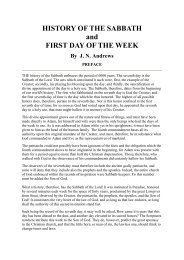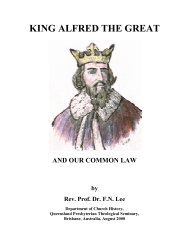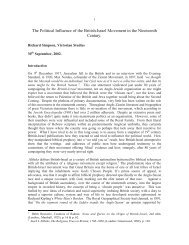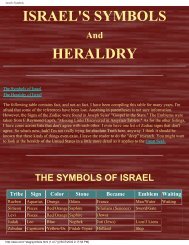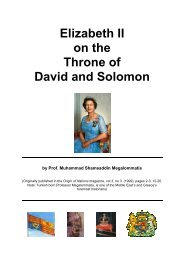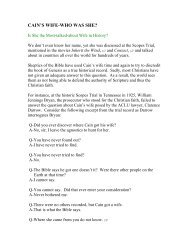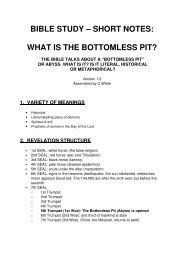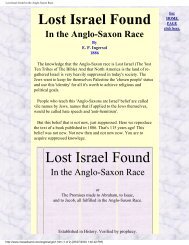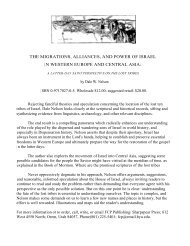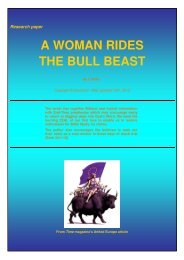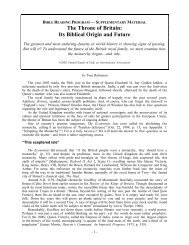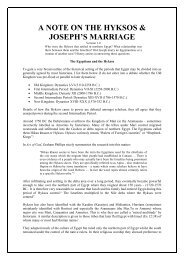Our Scythian Ancestors - Origin of Nations
Our Scythian Ancestors - Origin of Nations
Our Scythian Ancestors - Origin of Nations
Create successful ePaper yourself
Turn your PDF publications into a flip-book with our unique Google optimized e-Paper software.
<strong>Our</strong> <strong>Scythian</strong> <strong>Ancestors</strong>OUR SCYTHIAN ANCESTORSIDENTIFIED WITH ISRAELByColonel J.C. Gawler"<strong>Our</strong> <strong>Scythian</strong> <strong>Ancestors</strong>" is a common term which may be found in the most epitomised history <strong>of</strong> ourorigin: but though it takes us half way to our goal, the second half is not so easily bridged; and theproblem is before us to identify these our <strong>Scythian</strong> ancestors with the lost tribes <strong>of</strong> Israel.There is in our national status and mission more than sufficient to convince any thinking person that weare in the position assigned by God to the seed <strong>of</strong> Abraham, doing, in fact their duty, and enjoying theblessings promised to them. It seems unreasonable, and worse than unreasonable, to suppose that God,who foreknew the backslidings <strong>of</strong> Israel, would have held out promises and hopes to Abraham regardinghis seed, when He had foreordained or foreknew that that seed should not attain to them; and thatdeclining to use any longer the seed <strong>of</strong> Abraham as His main instruments, He purposed to pick up, andabout the time <strong>of</strong> Moses was actually preparing, a gang <strong>of</strong> obscure wanderers, with whom He decided to
<strong>Our</strong> <strong>Scythian</strong> <strong>Ancestors</strong>continue, in this more blessed dispensation, as plan for the regeneration <strong>of</strong> the human race."I called him (Abraham) alone." (Isaiah 51:2)"Ask now <strong>of</strong> the days that are past, which were before thee, since the day that God created man upon theearth; and ask from the one side <strong>of</strong> heaven unto the other whether there hath been any such thing as thisgreat thing is, or hath been heard like it; Hath God assayed to go and take Him a nation from the midst<strong>of</strong> another nation?. . . Unto Thee it was showed that thou mightest know that the Lord He is God: and,because He loved thy Fathers, therefore He chose their seed after them, and brought thee out in His sightwith His mighty power out <strong>of</strong> Egypt." (Deut. 4:32)"Thy Lord thy God hath chosen thee to be a special people unto Himself above all people that are uponthe face <strong>of</strong> the earth. The Lord did not set His love upon you because ye were more in number than anyother people; for ye were the fewest <strong>of</strong> all people. But because the Lord loved you, and because Hewould keep His oath which He had sworn unto your fathers, hath the Lord brought you out with a mightyhand." ( Deut. 7: 6-8)"Only the Lord had a delight in thy fathers to love them, and He chose their seed after them, even you,above all people, as it is this day." (Deut. 10:15.)I say it is delightful and encouraging in these times when infidelity is gaining such a hold in the world, tohave such a brilliant light thrown over God's word, to be able to prove to the sc<strong>of</strong>fer that our God keepscovenant to the most infinitesimal part <strong>of</strong> the spirit and letter <strong>of</strong> what He has uttered; that He is the God<strong>of</strong> Truth that He declares Himself to be. I say it is a most triumphant answer to be able to point to Hisdealings, His watchfulness, and care during upwards <strong>of</strong> 2,500 years; and the discovery should makeevery earnest believer exult at the power thus given him at a moment when the hosts <strong>of</strong> hell are almostassailing the Throne <strong>of</strong> God. It should raise us individually and nationally in self respect, and renew ourenergies, to find that we have a status in the eyes <strong>of</strong> the most High, and a mission and a duty to performto the world.In bringing forward points <strong>of</strong> identification between "our <strong>Scythian</strong> <strong>Ancestors</strong>" and the lost Tribes, it mustbe understood that the subject is yet in its infancy. A good amount <strong>of</strong> evidence has been obtained, but itis a mere drop in the ocean to what we may expect. We want more research, more persons who willapply themselves studiously to the investigation <strong>of</strong> the subject. We invite questioning for the verypurpose <strong>of</strong> testing any apparently weak points, by which we shall obtain a clue as to the evidence mostneeded; for, be it understood that we have no idea <strong>of</strong> bolstering up a case which will not bear scrutiny.Scythia proper, then, in the times <strong>of</strong> Herodotus (book iv. cap.101) is described as lying between theDanube and the Don. The <strong>Scythian</strong> nation was made up <strong>of</strong> various tribes having different names, thoughall are classed under one general name. Herodotus distinguishes, moreover, between tribes belonging tothe <strong>Scythian</strong> nation, and tribes living among them having <strong>Scythian</strong> habits, but who were not <strong>Scythian</strong>s bytradition or language. This distinction is not drawn by all writers.
<strong>Our</strong> <strong>Scythian</strong> <strong>Ancestors</strong><strong>of</strong> history before the Persian war to exact chronology. Herodotus (book iv, cap. 5-7) states that the<strong>Scythian</strong>s say that theirs "is the most recent <strong>of</strong> all nations. They reckon the whole number <strong>of</strong> years fromtheir first beginning, from King Targetaus" (about whom more presently) "to the time that Darius crossedover against them, to be not more than a thousand years, but just that number."Now Darius' expedition against the <strong>Scythian</strong>s was about 500 B.C., and 1000 years before that brings usto the time <strong>of</strong> Moses.Thus, their being, according to their own account, "the most recent <strong>of</strong> all nations," reminds us forcibly <strong>of</strong>several passages in Deuteronomy, where they are told that they were once few, and were taken from themidst <strong>of</strong> another nation. Also in <strong>of</strong>fering their first-fruits they were commanded to say (Deut.26:5), "ASyrian and ready to perish was my father, and he went down into Egypt, and sojourned there with a few,and became there a nation, great, mighty, and populous."The date assigned by them to their first existence as a nation under a king or chief., the place whencethey sprang so far as their neighbours would be able to trace them; and the date when they began to makethemselves felt in that locality, correspond exactly with Israel in the time <strong>of</strong> Moses; with the place <strong>of</strong>Israel's captivity, and the date <strong>of</strong> the same (740-720), allowing thern nearly one hundred years to increaseand "feel their own feet."CHARACTERISTICS.Herodotus (book iv. cap. 24) speaking <strong>of</strong> some very remote people, apparently Tartar races, lying at thefoot <strong>of</strong> l<strong>of</strong>ty mountains, states, "The <strong>Scythian</strong>s frequently go there, from whom it is not difficult to obtaininformation, as also from Greeks belonging to the part <strong>of</strong> Borysthense, and other ports in Pontus. The<strong>Scythian</strong>s who go there transact business by means <strong>of</strong> seven interpreters and seven languages."Again (book iv. cap. 46), Herodotus says, "The Euxine Sea, to which Darius led an army <strong>of</strong> all countriesexcept the <strong>Scythian</strong>s, exhibits the most ignorant nations; for we are unable to mention any one nation <strong>of</strong>those on this side Pontus that has any pretensions to intelligence; nor have we ever heard <strong>of</strong> any learnedman amongst them, except the <strong>Scythian</strong> nation and Anacharsis."In Keating's Irish history, translated by Dermond O'Connor in 1723, I find at p.24, "Epiphanius says thatthe laws, customs, and manners <strong>of</strong> the <strong>Scythian</strong>s were received by other nations as the standards <strong>of</strong>policy, civility and polite learning.""AEschylus too .... says, 'but the <strong>Scythian</strong>s governed by good laws and feeding on cheese <strong>of</strong> mare's milk.'And this is still the opinion entertained <strong>of</strong> them by the Greeks; for we esteem them the most sincere, theleast deceitful <strong>of</strong> any people, and much more frugal and self-relying than ourselves." (Strabo, book viii.,iii. 7)Now, whence this energy in commerce, these laws, this refinement, learning, and intelligence as a nation
<strong>Our</strong> <strong>Scythian</strong> <strong>Ancestors</strong>so markedly superior to the other very ignorant people who dwelt in their neighbourhood?Another remarkable feature was their knowledge <strong>of</strong> architecture. The Irish historians note these<strong>Scythian</strong>s coming there as being highly skilled in architecture; and according to the reports <strong>of</strong> theRussian Archaeological Society, the tornbs and tumuli ascribed to the <strong>Scythian</strong>s, along the shores <strong>of</strong> theBlack Sea, reveal the finest turned arches imaginable; and it is scarcely necessary to remind anyEuropean that the Goths had a style <strong>of</strong> architecture which bears their name, and excites admiration to thisday. To say the least <strong>of</strong> it, it was a very strange acquirement for a people commonly supposed to havebeen a set <strong>of</strong> wild nomads.Herodotus iv. 63. "Swine they never use nor suffer them to be reared in their country at all."THE SAKAISpelt from the Latin with a "C," they are <strong>of</strong>ten called Sacae, which is not the proper pronunciation. Theletter used in the Greek, is the k. The word Sakai, or Sacoae, is fairly, and without straining orimagination, translatable as Isaacites. It has been pointed out by Wilson and others that the initial I, orHebrew character , is only a prefix. The Hebrew for "laughter" is " tsahhak," and this conveys Sarah'smeaning (see Genesis 21:6) as accurately though not so forcibly as Itsahhak. The Hebrew characterbefore a verb denotes a tense, and before a noun it indicates " permanence," "strength," "excellence."But, supposing it were not so, people would very soon for brevity's sake drop the initial I and call themTsaki, in preference to Itsaki.Of the SAKAI Herodotus says (book vii. cap. 64) "The Persians call all the <strong>Scythian</strong>s Sakai." By otherwriters the SAKAI are frequently called Sakans, Saccassani, Saccassuni, and Saxones. Wilson"Watchmen <strong>of</strong> Ephriam," at p. 310, vol. i. says that the Nineveh marbles record the rebellion <strong>of</strong> a peoplecalled Esakska, who had called themselves in their own country " Beth Isaac," or "House <strong>of</strong> Isaac." God'spromise to Abraham was, "In Isaac shall thy seed by called," and in Amos 7: 9-16, " Israel" and the"House <strong>of</strong> Isaac" are used synonymously, and distinct from Judah.Strabo mentions Saccasena as a district <strong>of</strong> Armenia, in several places, and says (book xi. cap. 8, sec. 4),"The Sakai got possession <strong>of</strong> the most fertile tract in Armenia, which was called after their own nameSaccassene."Plane (book vi. cap. 16) says that the Sakai were among the most distinguished people <strong>of</strong> Scythia, and(book vi. cap. 11), that those who settled in Armenia are named "Saccassani."Ephorus "cites Choerilus who, in his passage <strong>of</strong> the bridge <strong>of</strong> boats which Darius (Xerxes?) had made,says, 'And the sheep-feeding Sakai, a people <strong>of</strong> <strong>Scythian</strong> race, but they inhabited wheat-producing Asia:truly they were a colony <strong>of</strong> nomads, a righteous race.' " (Strabo vii., iii. 9)
<strong>Our</strong> <strong>Scythian</strong> <strong>Ancestors</strong>Sharon Turner quotes Ptolerny as mentioning a <strong>Scythian</strong> people sprung from the Sakai named Saxones.(S.T. "Anglo-Saxons" vol. i p. 100)I find it stated in Ortellius' Thesaurus, "Armeniam quando Saccacenam appellatam fuisse, scribit idemEustathius a Sacis nimirum occupantibus:' which accords with Diodorus' and Herodotus' statementsalready quoted regarding the first appearance <strong>of</strong> the <strong>Scythian</strong>s and their conquests in Asia Minor.I therefore identify the Sakai with the <strong>Scythian</strong>s on the statements <strong>of</strong> the most distinguished ancienthistorians, and their name seems to denote an Israelitish origin.The locality in which they make themselves best known, vis., Asia Minor, near the Caspian, is held bymost writers to be the place to which the Israelites were transplanted. See II Esdras 13:43, which saysthat they crossed the Euphrates by the narrow passages <strong>of</strong> the river, i.e., to the N.N.E <strong>of</strong> Palestine. Againin Ezra 8:17, we find that, having no Levites, Ezra, sent messengers to Iddo, the Chief <strong>of</strong> the Casiphia,"that they should bring unto us ministers for the house <strong>of</strong> God." Casiphia is stated in Dr. Henderson'sRussian researches to be a country bordering on the Caspian.Here, then, some <strong>of</strong> the Israelites were in power in Ezra's time.From "The Saxons <strong>of</strong> the East and West," with translations <strong>of</strong> the rock records in India, by Dr. Moore,printed in 1861, I have gathered some valuable facts. In Alexander's time we hear <strong>of</strong> some <strong>of</strong> the Sakaion the confines <strong>of</strong> India. These Eastern Sakai are connected with the Western Sakai, because the "WhiteIsland, England, Sacam or Saxum, as pronounced by our Saxon ancestors is stated in the Purana namedVeraha to have been in the possession <strong>of</strong> the Sacs, at an early period." The rock and pillar inscriptions <strong>of</strong>the Sakhs, who also introduced Buddhism into India, are to be found in Afghanistan, Bombay, Delhi,Allahabad, and elsewhere. They are in the so-called Aryan character, and become intelligible by"transliteration" into Hebrew. They appear to be the utterances <strong>of</strong> people who have been brought throughgreat trials, who are groping in the dark though believing they have a Divine mission. "Sak," their deity,after whom they call themselves, is apparently a man and an ancestor. Sometimes they call themselves "Budh;" and Moore points out that the Budii are mentioned by Herodotus as a <strong>Scythian</strong> people living inMedia, and that in Hebrew it signifies "separated." The inscriptions contain occasional mention <strong>of</strong> theGetae, Goths, and Gotha, the tribe <strong>of</strong> Dan, and the Nethinim. (I Chron. 9:2)The Afghans, Pathans, Karens, and some people in the mountains <strong>of</strong> China, are traced as the descendants<strong>of</strong> the Indo-Saxons. The Afghans call themselves Beni-Israel. And there is one section called Yusufzai,and another Isakzai.THE GETAE.The Gatae were a portion <strong>of</strong> the <strong>Scythian</strong> nation, <strong>of</strong> whom, as having been more in contact with theGreeks, we have more details. Herodotus describes them in book iv. cap. 93, as "the most valiant and
<strong>Our</strong> <strong>Scythian</strong> <strong>Ancestors</strong>most just <strong>of</strong> the Thracians."When Darius made his expedition against the <strong>Scythian</strong>s, B.C. 500, he calls those occupying the southbank <strong>of</strong> the Danube Gatae, and those on the north bank he calls <strong>Scythian</strong>s. Arrian, in his account <strong>of</strong>Alexander's expedition, gives the name <strong>of</strong> Gatae to the people who occupied both banks (Arrian, cap.iii.). He says that there were many boats on the Danube for fishing, commerce, and piracy. But the fullestdescription embodying the accounts <strong>of</strong> various authors is given by Abraham Ortellius in his TheatrumOrbis Terrarum. (British Museum, c. 46 I., under head <strong>of</strong> Dacia et Moesia.)"The Inhabitants <strong>of</strong> Dacia, the Greeks call Daci, the Latines Gatae, as Pliny, Doin, Stephanus, and othersdo testify: (this also Cottiso, sometime the king <strong>of</strong> that nation, doth confirm; whom Suetonius nameth theking <strong>of</strong> the Getes; Horace calleth him Dacum a Dake:) item Iornandes saith that the Romans indifferentlycalled thern Daci, or Gothi. I do observe that Herodotus and the writers about that age generally,comprehended them under the name <strong>of</strong> the Scythae, <strong>Scythian</strong>s; to whom also the aforesaid Iornandesdoth wholly assent and agree."Moreover, Arrianus writeth that the Gatae were also called Apanthonizontes; but it is to be amended,and out <strong>of</strong> Herodotus' first book to be written Athanatizontes, as who say immortals, for they [sic] doverily believe that they shall never die, but after their departure out <strong>of</strong> this life go presently unto oneZamolxis, a saint or idol which they do specially worship and adore.""..... Strabo in the seventh book <strong>of</strong> his Geography, and Virgil in the third <strong>of</strong> his Georgicles, do speake <strong>of</strong>the desertes and wildemesses <strong>of</strong> the Gatae. The same author calleth it 'gentem idomitam' au unrulienation. Statius saith that they are hairie, unshorne, furred or clad in skins, inhumane, sturdy, stern,wearing long side breeches and mantles (like our Irishmen)." I read in Pliny, that they used to paint theirfaces ( like unto our Britains). That there is not a more stern nation Ovid the poet very truly wrote <strong>of</strong>them. Vegetius, who wrote <strong>of</strong> the art <strong>of</strong> war, saith that it is a very warlike people, having, indeed, as theprince <strong>of</strong> poets testifieth, God Mars for their lieutenant and governor. Of Claudian it is namedBellipotens, a mighty nation for warlike men."They were in time past so strong, as Strabo writeth, that they were able to make an army <strong>of</strong> 200,000men. Josephus, in his second book against Appian " (Antiq. xviii. 1,5 ?), "writeth, There are a certainkind <strong>of</strong> Dakes, commonly called Plisti, whose manner <strong>of</strong> life be compareth to the course <strong>of</strong> life <strong>of</strong> theEssenes. These I do verily believe are the same with those which Strabo calleth Plistae, and were <strong>of</strong> thestock <strong>of</strong> the Abii" ( a <strong>Scythian</strong> tribe mentioned by Arrian as "the justest people in the world.")These Essenes were a highly moral and sedate sect <strong>of</strong> the Jews: very much resembling our Quakers intheir manner <strong>of</strong> life; they were very much attached to the books <strong>of</strong> Moses. They are described byJosephus in Antiquities <strong>of</strong> the Jews (book xviii., cap. i., ii., and viii.). In cap i sec. 5 he says <strong>of</strong> them:-"They ascribe all things to God, they teach the immortality <strong>of</strong> souls, and esteem that the rewards <strong>of</strong>righteousness are to be earnestly striven for. They exceed all other men that addict themselves to virtue,and this in righteousness. They do the most resemble those Daci who are called Polistae."
<strong>Our</strong> <strong>Scythian</strong> <strong>Ancestors</strong>It has been conjectured that the Zamolxis <strong>of</strong> the Gatae may stand for Sar Moses, the chief or princeMoses. Herodotus states that the Greeks say that Zamolxis was a slave who acquired great riches,obtained his freedom and then preached, to his own countrymen immortality. Strabo adds that heacquired his knowledge in Egypt. (vii. iii. 5).As already stated, we learn from Herod. iv. cap. v., that the <strong>Scythian</strong>s speak <strong>of</strong> their first king orprogenitor as Targetaus, which, I think, helps to prove the family connection between the Gatae and the<strong>Scythian</strong>s. The name may stand for Sar-getaus, and I find in Ortellius' Thesaurus, "Zagathai est Scythiaintra Imaus, " or Zagathai is Scythia within the Imaus; i.e., west <strong>of</strong> an imaginary spur form MountTaurus."Sharon Turner, vol. i., book ii., cap. i., says distinctly, "The <strong>Scythian</strong> tribes have become better known tous in recent periods under the name <strong>of</strong> Getae or Goths."In connection with the saint, idol, or deity <strong>of</strong> these Gatae, and their pedigree, Nennius, who wrote hisHistoria Brit. in the tenth century, or the fifth year from Edmund king <strong>of</strong> the Angles, says, at sec. 31: -"Three vessels exiled from Germany arrived in Britain. They were commanded by Hors and Hengistbrothers, and sons <strong>of</strong> Guictlis; Guictlis was the son <strong>of</strong> Guicta, Guicta <strong>of</strong> Guecta, Guecta, <strong>of</strong> Woden,Woden <strong>of</strong> Freal<strong>of</strong>, Freal<strong>of</strong> <strong>of</strong> Fredulf, Fredulf <strong>of</strong> Finn, Finn <strong>of</strong> Folegauld, Folegauld <strong>of</strong> Geta, who as theysay, was the son <strong>of</strong> a god, not <strong>of</strong> the omnipotent God, but the <strong>of</strong>fspring <strong>of</strong> one <strong>of</strong> their idols, and whom,blinded by some demon, they worshipped according to the custom <strong>of</strong> the heathen."Woden, or Odin was one <strong>of</strong> their renowned chieftains, and was perhaps more worshipped that Geta. Asregards this Geta, in a footnote <strong>of</strong> the Bagaudae, Sharon Turner, vol. i. p. 184, says: " To Scaliger's noteon the Bagaudae, Animad. Euseb. 243, we may add that Bagat in Armorie is a troop or crew. (Lhuyd.Archaiol. 196) Bagach in Irish is warlike; in Erse is fighting. Bagad in Welsh is multitude." (Gen. 30:11.)"And Leah said bagad, (with a troop) and she called his name Gad." This may suggest the origin <strong>of</strong> thename Gatae, i.e., Gadi, Gadites. (I Chron. v. 18, Heb.)Agnes Strickland, in vol. i. <strong>of</strong> her "Queens <strong>of</strong> England" mentions that the pedigree <strong>of</strong> Matilda, <strong>of</strong> theSaxon line <strong>of</strong> Edgar Atheling, was traced through Woden to the Jewish patriarchs. Whether true or false,therefore, there was the early Saxon belief in the descent from Israel.THE GOTHSAs to the relative merits <strong>of</strong> the Goths and Romans, Sharon Turner, vol. i. p. 184, quotes Salvian, anecclesiastic <strong>of</strong> Marseilles, who, writing <strong>of</strong> his own times, says: "there is one consenting prayer among theRoman population, that they might dwell under the barbarian Government. Thus our brethren not onlyrefuse to leave these nations for their own, but they fly from us to them. Can we then wonder that theGoths are not conquered by us, when the people would rather become Goths with them than Romanswith us?" (Salvian, p. 92)
<strong>Our</strong> <strong>Scythian</strong> <strong>Ancestors</strong>Much <strong>Scythian</strong> history was transmitted through the centuriesby specially trained Bards.
<strong>Our</strong> <strong>Scythian</strong> <strong>Ancestors</strong>A solid gold comb from the Solokha Tumulus(This example <strong>of</strong> <strong>Scythian</strong> art is hardly the mark <strong>of</strong> an uncivilized people)A Jewish gentleman <strong>of</strong> great learning, who possesses a great amount <strong>of</strong> information upon these subjects,and who was present at a meeting at Kensington, recommended our perusal <strong>of</strong> a book written by a Jew,the Rev. M. Sailman, in 1818, entitled "Researches in the East; an important account <strong>of</strong> the Ten Tribes."I think I am right in saying that our friend was no participator in our views, and that he recommended thebook by way <strong>of</strong> setting us straight.The book exhibits great research, and has proved a most valuable acquisition by the references which itgives to various authors, and rivets, I may say, a previously weak link. It states at page 25, that "on theauthority <strong>of</strong> several Armenian historians, the ten tribes passed to Tartary." It also quotes Ortellius, who, itsays, " in his description <strong>of</strong> Tartary, notes the kingdom <strong>of</strong> Arsareth, where the ten tribes retiring" (seealso II Esdras 13:45), " took the name <strong>of</strong> Gauthei" because, he says, they were very jealous <strong>of</strong> the glory<strong>of</strong> God.Sailman also cites " Eldad" a Jewish writer, who sent to the Spanish Jews his memoirs <strong>of</strong> the ten tribes.He is said to have lived in the ninth, or fourteenth century. He states (pp. 20-21) that many <strong>of</strong> the peopledid not go into captivity, but evaded the calamity, going <strong>of</strong>f with their flocks, and turning into nomads,and that the chief or prince whom they appointed could muster 120,000 horse and 100,000 foot.I observe that Wilson has independently suggested such a thing. He says: "By mention being made inIsaiah 10:20 <strong>of</strong> the escaped <strong>of</strong> the house <strong>of</strong> Jacob, as well as remnant <strong>of</strong> Israel which had been taken bythe Assyrians, it seems to be intimated that a considerable number had fled from the land, rather thanremain to be led way at the will <strong>of</strong> the enemy."Note the account <strong>of</strong> the Simeonites (I Chron. 4:39) also the common cry, " to your tents, 0 Israel;" seealso I Sam. 31:7, which induce the belief that large numbers <strong>of</strong> the Israelites never "took kindly" to thecities, but preferred the independent open-air in which their fathers had been reared.TRADITIONSBefore proceeding to more important points, it may not be amiss to examine one or two legends. Ancienthistory is <strong>of</strong>ten little better than a collection <strong>of</strong> traditions, but even in the greatest extravagances <strong>of</strong>mythology we can sometimes detect the fact or truth upon which a story is based.The <strong>Scythian</strong> account <strong>of</strong> their king, "Targetaus," according to Herdotus, book iv., cap 5, is that he was ason <strong>of</strong> Jupiter and a daughter <strong>of</strong> the river Borysthenes. The Grecian account <strong>of</strong> this progenitor <strong>of</strong> the
<strong>Our</strong> <strong>Scythian</strong> <strong>Ancestors</strong><strong>Scythian</strong>s is (Herod. iv. cap. 8) that he was one Skuthees, the son <strong>of</strong> Hercules and a woman half humanhalf viper.These two traditions I am inclined to consider as vestiges <strong>of</strong> the story <strong>of</strong> the "drawing" Moses out <strong>of</strong> thewater (Ex. 2:10), as expressed by Pharaoh's daughter; and one <strong>of</strong> those never-to-be-forgotten eventswhich happened to the Israelites, that type <strong>of</strong> the God-man, who was made sin for us, the elevation <strong>of</strong> thebrazen serpent in the wilderness; with the wanderings <strong>of</strong> the Israelites, in which, as I shall presentlyshow, the name SKUTHIS seems to have a distinct connection.ETYMOLOGY OF THE WORD "SCYTHIAN"Herdotus, book iv. cap. 6, says that it is the Greeks who call them <strong>Scythian</strong>s or Skuthia, from thisSKUTHIS, but that they call themselves "Scoloti." Now, as to the origin and meaning <strong>of</strong> this wordSKUTHIS: in Greek it has no signification, but was merely the name <strong>of</strong> the mythical son <strong>of</strong> Jupiter andthe half serpent woman. But it has nevertheless been so employed to designate a wandering people, thatMr. P. Smith, in, "Ancient History <strong>of</strong> the East," p.472, conjectures that <strong>Scythian</strong> "was not an ethnic namebut rather as we now use 'nomad,' a generic designation <strong>of</strong> certain wandering or pastoral tribes."It no doubt came to be so applied by writers about the time <strong>of</strong> Strabo; but, as before observed, Herodotus,who lived some four hundred years earlier, discriminates between tribes <strong>of</strong> the <strong>Scythian</strong> nation and thetribes <strong>of</strong> <strong>Scythian</strong> habits, who were not <strong>Scythian</strong> by tradition or language.Again, the name <strong>of</strong> Scotland, or Scotia, applied to Scotland and the North <strong>of</strong> Ireland, has beenconjectured by some to be derived from SKOTOS "darkness," because people in those latitudes gotamong the fogs; but it is, on the most conclusive evidence, an ethnic or tribal name. The people werecalled Scoti in Spain before they came to Ireland, and regarding this, one legend is that their chiefmarried a Daughter <strong>of</strong> Pharaoh named Scota, and on her account called his people Scoti; another Irishlegend states that they were called Scoti "from their leader Ebur Scut, or Ebur the <strong>Scythian</strong> latinisedScoti"Now, Sandford, Lancaster Herald <strong>of</strong> Arms in the time <strong>of</strong> James II, states that when Edward I brought thecoronation stone from Scotland, there was a piece <strong>of</strong> wood attached to it, on which were cut in Latin theFollowing lines:-"Ni fallet fatum Scoti hunc quocunque locatum,Invenient lapidem regnare tenentur ibidem.""If fates go right, where'er this stone is found,The Scots shall monarchs <strong>of</strong> that realm be found."
<strong>Our</strong> <strong>Scythian</strong> <strong>Ancestors</strong>Sir Walter Scott's translation <strong>of</strong> Irish lines, regarding the same stone into English, writes thus: -"Unless the fates be faithless grown, or prophet's voice be vain,Where'er is found this sacred stone, the wanderer's race shall reign."Hence Scots, <strong>Scythian</strong>s, or Skuthai, and wanderers appear to be synonymous terms. Now in GreekSkuthai has no meaning; but if I find a language in which such a word has a meaning which indicateswandering, I have grounds for assuming that the people to whom that language belongs are the owners ororiginators <strong>of</strong> the name.In Hebrew S'cots means "booths" (see Genesis 33:17) or temporary dwellings, such as gipsies would use,and the dwellers in them would be as we should say, Succothites.In Leviticus 23:33-43, I find, "And the Lord spake unto Moses, saying, The fifteenth day <strong>of</strong> this seventhmonth shall be the feast <strong>of</strong> S'coth (Tabernacles) for seven days unto the Lord.... And ye shall take you onthe first day the boughs <strong>of</strong> goodly trees, branches <strong>of</strong> palm trees, and willows <strong>of</strong> the brook; and ye shallrejoice before the Lord your God seven days: all that are Israelites born shall dwell "ba S'cot," thatyour generations may know that I made the children <strong>of</strong> Israel to dwell "ba S'cot," when I brought themout <strong>of</strong> the land <strong>of</strong> Egypt: I am the Lord your God."Thus, besides S'coth meaning a temporary abode, we have here the institution <strong>of</strong> a feast <strong>of</strong> S'cot tocommemorate the wanderings in the wilderness, when the Israelites were S'cothi, or dwellers in booths;and this seems to give the origin <strong>of</strong> the Greek Skuthai, and to give a reason for the legend regarding thedivine origin <strong>of</strong> Skuthees and his half viper mother.It should be here noted that so much importance is attached by the Almighty to this S'coth, orcommemoration <strong>of</strong> the wanderings, that in Zechariah 14:16 it is stated that, after the final overthrow <strong>of</strong>all infidel powers at Jerusalem, all nations will be required to come up yearly to Jerusalem to keep thefeast <strong>of</strong> S'coth.Herod., book iv. cap. 6, says that the <strong>Scythian</strong>s called themselves "Scoliti," which I submit as probablyrepresenting Succoti or Succothi.Englishmen acquainted with Hebrew may object to my calling S'cot, what they would call Succoth, butsingularly enough, the Sephardim, or Spanish Jews, pronounce it S'cot, and the Scoti, or Scots, actuallycame from Spain. The Ashkenazim, or German Jews, would call it S'cos, or S'coth.FURTHER EVIDENCE.I extract the following from transactions <strong>of</strong> the Biblical Archaeological Society. (Vo. iii. Part I.)
<strong>Our</strong> <strong>Scythian</strong> <strong>Ancestors</strong>"The old gravestones in the Crimea," writes Neubauer, "which are now recognized as genuine by all men<strong>of</strong> learning, attest that there were Jewish (?) communities in the Crimea as early as the year A.D. 6, andthat the Jews there help themselves to be descended from the ten tribes. Three different eras are recordedon these monuments, as well as in many ancient manuscripts <strong>of</strong> the Karaites: first, the era <strong>of</strong> the captivity<strong>of</strong> the ten tribes, B.C. 696; second the Karaite era <strong>of</strong> the creation, B.C. 3911: third, the era according tothe reckoning <strong>of</strong> the inhabitants <strong>of</strong> Metarcha, that is, the common rabbinical era <strong>of</strong> the creation, B.C.3760."There are also facsimiles <strong>of</strong> three <strong>of</strong> the gravestones, out <strong>of</strong> several which have been carried up to St.Petersburg, with these inscriptions:No. 1"This is the tombstone <strong>of</strong> Buki, the son <strong>of</strong> Izchak, the priest. May his rest be in Eden at the time <strong>of</strong> thesalvation <strong>of</strong> Israel. In the year 702 <strong>of</strong> the years <strong>of</strong> our exile (A.D. 6)."No. 2"Rabbi Moses Levi died in the year 726 <strong>of</strong> our exile (A.D. 80)."No. 3"Zadok the Levite, son <strong>of</strong> Moses, died 4000 after the creation, 785 <strong>of</strong> our exile (A.D. 89)."It was a part <strong>of</strong> God's plan <strong>of</strong> mercy in the darkest periods <strong>of</strong> Israel's history to keep Himself among themwitnesses for the truth. Thus when Elijah thought that he alone was left a servant <strong>of</strong> Jehovah, God toldhim that He had reserved to Himself seven thousand men who had not bowed the knee to the image <strong>of</strong>Baal (I Kings 19:14-18); and when the tribes escaped or went into captivity, such men would be amongthem; Ezekiel and Daniel, to wit. With reference to these tombstones in what was then Scythia, it is morethan probable that communication was kept up through their tribes across Armenia, as well as by sea,with the whole <strong>of</strong> the civilized world, and with their brethren both in Palestine and Babylon. In thesetombstones we seem to recognize that, barbarised and paganised as large numbers <strong>of</strong> the <strong>Scythian</strong>s musthave been, there was yet among them, according to God's mercies <strong>of</strong> old, a goodly leaven <strong>of</strong> God's elect,who witnessed for Him, stood out against sin, and maintained amidst much barbarism, laws, civilization,and learning which astonished the Greek, and puzzled many writers and more readers by the strangecontrast and seeming contradictions.Christianity early took root among these <strong>Scythian</strong>s or Goths. A Gothic bishop was present at the Council<strong>of</strong> Nicaea, A.D. 325, and Bishop Ulfilas, in the same century, translated the whole, or very nearly thewhole old Testament, and the Lord's prayer into Moeso-Gothic. They were so far in advance <strong>of</strong> theRomans that the laws <strong>of</strong> the Visigoths were digested onto a regular code fifty years before the pandects<strong>of</strong> Justinian.
<strong>Our</strong> <strong>Scythian</strong> <strong>Ancestors</strong>SUMMARYTo summarize then the evidence regarding our <strong>Scythian</strong> ancestors:-Date <strong>of</strong> appearance.The date assigned by themselves to their first existence under a king corresponds with the date <strong>of</strong> theIsraelites under Moses, i.e., one thousand years before the expedition <strong>of</strong> Darius.The date assigned by Herodotus to disturbances among the peoples <strong>of</strong> Asia Minor, caused by themovements <strong>of</strong> the <strong>Scythian</strong>s, affords ample time, subsequent to some <strong>of</strong> the invasions <strong>of</strong> Palestine, withinwhich a people <strong>of</strong> powerful mind, with the training <strong>of</strong> the Israelites, whether refugees or transplanted bya conqueror, could have rallied and asserted themselves.Place <strong>of</strong> appearance.The place <strong>of</strong> their appearance as a "despicable people" (Diodorus) i.e., as captives or refugees might becalled, enjoying a small tract <strong>of</strong> ground, corresponds with the place to which the Israelites were carriedcaptive.Their characteristics.(a) Their learning, as mentioned by Herodotus, in strange contrast with the ignorance <strong>of</strong> the other people<strong>of</strong> the Pontus; their laws and customs mentioned by Epiphanius as being the standards to other nations;and their knowledge <strong>of</strong> architecture, as attested by Irish history and Russian research, show them to havebeen something better than the mere wild nomads they are sometimes supposed to have been. They musthave had a history and a schooling.(b) Their abhorrence <strong>of</strong> swine accords with Israelitish customs.Their legends.The legend <strong>of</strong> their first king being the son <strong>of</strong> a river; the Greek legend <strong>of</strong> their king SKUTHIS being theson <strong>of</strong> Jupiter and a half serpent mother; the legend <strong>of</strong> a legislator Zamolxis, a slave who obtainedlearning in Egypt and preached immortality, have all a strong resemblance to principal points inIsraelitish history.Their various appellations.<strong>Scythian</strong> - What we call <strong>Scythian</strong> has an intelligible meaning in Hebrew in special connection with the
<strong>Our</strong> <strong>Scythian</strong> <strong>Ancestors</strong>the shadowy government which they respected; and it was the sacred custom <strong>of</strong> almost all their tribes,that a national council should be an inseparable portion <strong>of</strong> the sovereignty <strong>of</strong> each; in which all measures<strong>of</strong> the state should be considered and determined, and all taxes imposed, and to which every freeman thatwas aggrieved might appeal for redress."Hence, while a political submission became the mark and practice <strong>of</strong> the civilized, individualindependence and political liberty became the characteristic <strong>of</strong> the nomadic. A fierce and jealous spirit <strong>of</strong>control never left them... Yet amid these habits a fearless and enterprising spirit, and a personal dignityand a highminded temper were nourished; and the hardy and manly virtues became pleasing habits. Inthis life <strong>of</strong> constant activity, want, privation, courage, vigilance, endurance and exertion, the femalevirtues were called perpetually into action; and their uses were felt to be so important that the fair sexobtained among all the tribes <strong>of</strong> ancient Germany a rank, an estimation, and an attachment which wereunknown in all the civilized world <strong>of</strong> antiquity, and which the spirit <strong>of</strong> Christianity has since matured andcompleted."Page 9, - " <strong>Our</strong> ancestry sprang from this great barbaric, or nomadic stock."Of the "civilized" class he says, p.7: - "In the plains <strong>of</strong> warm and prolific climates, where men firstappeared and multiplied, ease, abundance, leisure, and enjoyment produced an early civilization with allits advantages and evils ... They became studious <strong>of</strong> quiet life, political order, social courtesy, pleasurableamusements, and domestic employments. They exercised mind in frequent and refined thought;perpetuated their conceptions and reasonings by sculptured imagery, written language, and an improvingliterature... They promoted and preserved the welfare <strong>of</strong> their societies by well-arranged governments -by a vigilant policy, and by laws, wise in their origin and general tenor, but <strong>of</strong>ten pursuing human actionswith inquisitorial severity, with vindictive jealousy, with sanguinary punishments, and with a minutenessand subtlety which destroyed individual freedom, and bounded public improvement."They have usually loved religion, though they have made it a slavery, whose established superstitions itwas treasonable to resist. They erected temples, oracles, and altars; they divided the energies andattributes <strong>of</strong> the Supreme Being into distinct personalities which they adored as divinities; made imagesand mythologies <strong>of</strong> each.. . But these civilized nations, notwithstanding all their improvements, and fromthe operation <strong>of</strong> some, have degenerated into sensuality, into the debasing vices, and to effeminatefrivolities.""The love <strong>of</strong> money, and a rapaciousness for its acquisition, and the necessities which continual luxuriescreate, have dissolved their social morality, and substituted a refined selfishness for that mutualbenevolence which reason desires, which Christianity now enjoins, and which our best sympathiessuggest. Superstition, irreligion, and despotism increase as the moral attachment to probity and orderlessen ... till states have subsided from secret and selfish disaffection into feeble and disunited masses,which enemies have shaken, and powerful invaders at last subdued.""Their mental progress, from all these causes, has been usually checked into that limited and stationary
<strong>Our</strong> <strong>Scythian</strong> <strong>Ancestors</strong>knowledge, soon becoming comparative ignorance, into which even the cultivation and social comforts<strong>of</strong> civilization have hitherto invariably sunk; and from which the irruptions, spirit and agencies <strong>of</strong> theNomadic tribes, or the newer kingdoms which they have founded, have repeatedly rescued the humanrace."Now, by what human agency did it please God to say that He would "rescue the human race?" Was it notby the seed <strong>of</strong> Abraham? The Saviour truly is the chief corner stone <strong>of</strong> the plan - once to suffer, by andby to reign. But that plan has very many elaborate details, and it is not yet worked out. How did Godbegin? The Bible tells us that he called one man, Abraham, and made a nomad <strong>of</strong> him! and his firstlessons were intended to give him confidence in his God, and then to test, strenghten, and confirm it. Lotabandoned the nomadic life, returned to the luxuries <strong>of</strong> cities, and lost his all. Isaac and Jacob, i.e., threegenerations, were Nomads (S'coti), and were further confirmed in faith and taught <strong>of</strong> God. Then theenlarged family is sent to school in Egypt to gain some worldly wisdom in arts and sciences, but underthe severest discipline; and again they become S'cothee to be taught <strong>of</strong> God, and are given laws,institutions, principles, and an organization which are the foundation <strong>of</strong> all modern civilization. "Thoushall love thy neighbour as thyself," was the second golden commandment given to these nomads. Theywere drilled to everything calculated to make them a clean, hardy, courageous, active, healthy,independent, God-fearing people, sound in mind as well as in body.Then they inherit their land to give them a status in the world as a nation; and, assuming the <strong>Scythian</strong>s tobe their representatives, we can understand their saying "that they are the most recent <strong>of</strong> all nations," thatthe laws, customs, and manners <strong>of</strong> the <strong>Scythian</strong>s were received by other nations as the standards <strong>of</strong>policy, civility, and polite learning."In their land they quieted down again comparatively, at one period at least, to books, arts, and sciences;but ease and splendour and a rich country were yet too much for human nature; idolatry, tyranny andcorruption overspread them, and God broke them up again; not at once, but in batches. A remnant wasrestored to the land to receive the promised Saviour, but they rejected Him, and have occupied asecondary position ever since.I say advisedly "a remnant," for until within the last few years, when people have begun to despair <strong>of</strong>finding the lost tribes, no one ever thought <strong>of</strong> calling the 50,000 who returned under Ezra as "all Israel."Why he (Ezra 7:15-20) had to send to Iddo the chief <strong>of</strong> Casiphia to send him Levites. And in the Manual<strong>of</strong> Ancient History, p. 347, I read, "the number <strong>of</strong> those who returned under the decree <strong>of</strong> Cyrus, B.C.536, appears not to have execeeded 50,000 and hence the Jewish traditions declare that "only the brancame out <strong>of</strong> Babylon, while the flour stayed behind."This I find mentioned in "History and Literature <strong>of</strong> the Israelites," by the Misses C. and A. de Rothschild,(London 1870,) who, at p. 538, state: "It must not be supposed that the appeal (in Cyrus' reign) wasresponded to by all classes <strong>of</strong> captive Jews alike; on the contrary, it was chiefly welcomed by the poorerpeople, while many <strong>of</strong> those who had found happy and prosperous homes in Babylon, hesitated to entrusttheir fortune to what they considered a hazardous enterprise, especially as they urged with apparent
<strong>Our</strong> <strong>Scythian</strong> <strong>Ancestors</strong>justice that they were merely to change their place <strong>of</strong> abode, but not their condition <strong>of</strong> dependence; thatthey were not to become a really free people with their own ruler and their own laws, but that they weredestined to remain under the yoke <strong>of</strong> Persia, which they would feel in Jerusalem as much as in Babylon.Thus as later Jewish writers expressed it, "the chaff only returned to Palestine, while the wheat remainedin Babylon."Hastened by the disturbances in their land, and favoured by their excellent education as nomads, theIsraelites broke, according to the tendency <strong>of</strong> mankind, into the sections before described, viz.: thecivilized and the barbaric or nomadic. And to my mind St. Paul recognizes this when he says (Colossians3:11). . . " where there is neither Greek (civilized Gentile) nor Jew (civilized seed <strong>of</strong> Abraham) barbarian(barbaric Gentile) nor <strong>Scythian</strong> (barbaric seed <strong>of</strong> Abraham)." If otherwise, where is the comparison? andwhat were the <strong>Scythian</strong>s as distinct from Greek, Jew, or barbarians? It will be recollected that the Greeksare quoted as the types <strong>of</strong> Gentile civilization and wisdom.Now, with regard to our ancestors, are we to suppose that these learned, hardy shrewd, independenttribes, whose laws and institutions are the foundation <strong>of</strong> those which we now enjoy, came self-instructedout <strong>of</strong> some hole or corner, stepped into Israel's shoes, and supplanted him in the Divine favour? or, fromthe very exact time that God was leading and teaching the Israelites by the hand <strong>of</strong> Moses, reiterating Hispromises, and calling them a peculiar people, and himself a Covenant-keeping God, are we to supposethat He was also leading, guiding, and educating another people, viz., these <strong>Scythian</strong>s, purposely tosupplant Israel in His favour, and to give them the mission He had assigned to the seed <strong>of</strong> Abraham? orare we to adopt the more reasonable conclusion that the breaking up <strong>of</strong> Israel from the promised land,was merely leading them away to "plead with them again in the wilderness" (Ezek. 20:35): to consolidateall the good they had acquired as a race, and to purge out evil by continual siftings, and that the Anglo-Saxon race, though there is much yet to improve, is the present result <strong>of</strong> one continuous plan <strong>of</strong> God inthe educating and perfecting <strong>of</strong> one race as his working instruments.If we examine the works <strong>of</strong> God around us, we see wonderful method in all His plans, - no indecision orchange <strong>of</strong> purpose; and as the redemption <strong>of</strong> man has been God's principal work on earth, to which allelse is subservient, it is difficult to believe that in this His chiefest work, He could have pursued anunstable policy. (Isaiah 51:1,2.) "I called him (Abrahani) alone."Jer. 31:35, 36. "If those ordinances depart from before Me, saith the Lord, then the seed <strong>of</strong> Israel alsoshall cease from being a nation before me for ever."Ps.80: "Give ear, 0 Shepherd <strong>of</strong> Israel, Thou that leadest Joseph like a flock," written at a time whenJoseph was supposed to have been two centuries in hopeless captivity!Isaiah 45:15. "Verily Thou art a God that hidest Thyself, 0 God <strong>of</strong> Israel, the Saviour. . . But Israel shallbe saved in the Lord with an everlasting salvation . . . .For thus saith the Lord that created the heavens;God Himself that formed the earth and made it ... He created it not in vain, He formed it to beinhabited... I am the Lord, and there is none else: I have not spoken in secret, in a dark place <strong>of</strong> the
<strong>Our</strong> <strong>Scythian</strong> <strong>Ancestors</strong>earth; 1 said not unto the seed <strong>of</strong> Jacob, Seek ye me in vain."And lastly, Ezekiel 11:15,16 written after the captivity <strong>of</strong> Israel, but before that <strong>of</strong> Judah, B.C. 594."Son <strong>of</strong> man, thy brethren, the men <strong>of</strong> thy kindred, and all the house <strong>of</strong> Israel wholly, are they unto whomthe inhabitants <strong>of</strong> Jerusalem have said. Get you far from the Lord, unto us is this land given possession.Therefore, thus saith the Lord: although I have cast them far <strong>of</strong>f among the heathen and although I havescattered them among the countries, yet will I be to them a little sanctuary in the countries where theyshall come."



